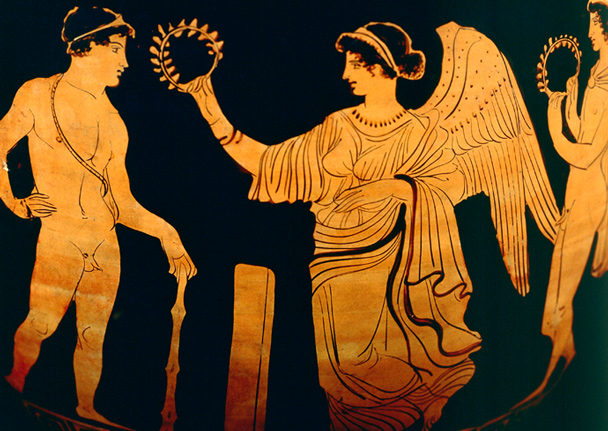Today, the topic of Olympic eating seems to be getting a lot of play in the media. Witness the recent frenzy over Olympic swimming champion Michael Phelps, who has denied rumors of a 12,000-calorie-a-day diet, but whose actual consumption—hefty, as you might imagine, considering the rigors of training and his London ambitions—continues to fascinate. But have Olympic athletes always eaten on an epic scale? What did the original Olympians of ancient Greece eat? We were curious, so we turned to University of California at Davis nutrition professor emeritus Louis E. Grivetti, PhD, who has published multiple articles on the history of Olympians and their diets.
Gourmet Live: Is there any record of what the athletes ate to prepare for the first Olympics, in 776 B.C.?
Louis E. Grivetti: There are no records this old. The first surviving record and mention of the diet of ancient Olympic athletes comes from Diogenes Laërtius, a Greek writer who flourished about a thousand years later, in the early decades of the third century. In his text, he quotes Philostratus [A.D. 170–c. 245], who compared and contrasted athletic diets through the years:
"These athletes [in olden times] washed in rivers and springs…learned to sleep on the ground…others on beds made of straw they gathered from the field. Their food was bread made from barley and unleavened loaves of unsifted wheat. For meat they ate the flesh of oxen, bulls, goats, and deer; they rubbed themselves with the oil of the wild olive. This style of living made them free from sickness and they kept their youth a long time."
GL: What more can you tell us about the early athletes' diets and how they evolved in ancient times?
LG: The diet of Greek and Roman athletes was highly variable, depending upon historical period, and ranged from regimens based on cereals, cheese, and fruits [figs, grapes] to a nearly all-meat [lamb, goat, beef, pork, doves, pigeons, sparrows] diet. Philostratus implies that in later years doctors to the Olympic athletes introduced fish, pork, and refined breads sprinkled with poppy seeds to the diet.
The diets of both Greek and Roman athletes would have developed in a Mediterranean pattern and would basically have been similar—with much of the food smothered in olive oil.
The question of fish is interesting. The training site at Elis [the city-state where the original Games were held]; is inland from the sea—in the earliest Greek classics, the heroes of Homer's Iliad and The Odyssey did not eat fish, as this was considered a "lesser" food.
As to how these diets evolved, Philostratus provided a clue that the diets of ancient athletes changed through time and became "fancy," which would be another way of saying that the diet patterns didn't follow a strict regimen but probably catered to the likes and whims of the individual athletes. Philostratus condemned the occupation of "cook," which he implies developed merely to please human palates. He also suggests that such chefs to ancient athletes prepared dishes that turned the athletes into gluttons.
GL: Do we have an idea of how much those early athletes ate during training and competition as compared with athletes today? Are there any records of portion sizes?
LG: There is no evidence, but one may assume that the ancient athletes ate more food—and better variety of food—than the everyday nonathletic Greek or Roman. The only mention regarding portion size is the oft-told story regarding the renowned wrestler Milo of Croton [6th century B.C.], who is said to have carried an ox into the stadium at Olympia, killed the ox, and then consumed it all—a feat that lies more in the realm of folklore than actual consumption patterns.
GL: Were any foods restricted in the ancient athletes' diets?
LG: None to my knowledge. However, there is a hint of a restriction in the following quotation from the Stoic Epictetus [A.D. 55–135], which is among my favorite all-time quotations from the past:
"You say 'I want to win at Olympia.' Look at what is involved both before and after, and only then, if it is to your advantage, begin the task. If you do, you will have to obey instructions, eat according to regulations, keep away from desserts, exercise on a fixed schedule at definite hours, in both heat and cold; you must not drink cold water nor can you have a drink of wine whenever you want. You must hand yourself over to your coach exactly as you would to a doctor."



 Pinterest
Pinterest


